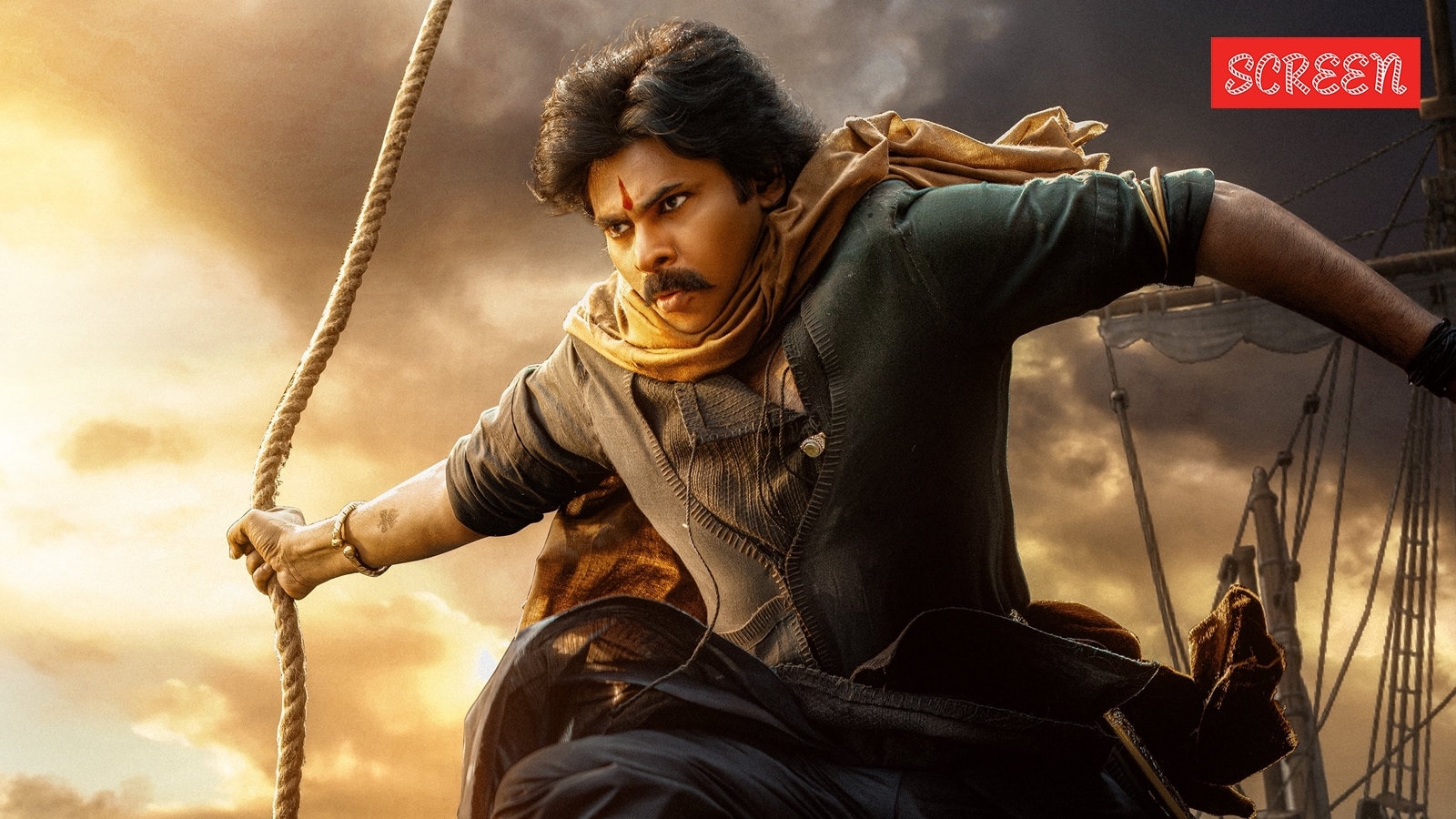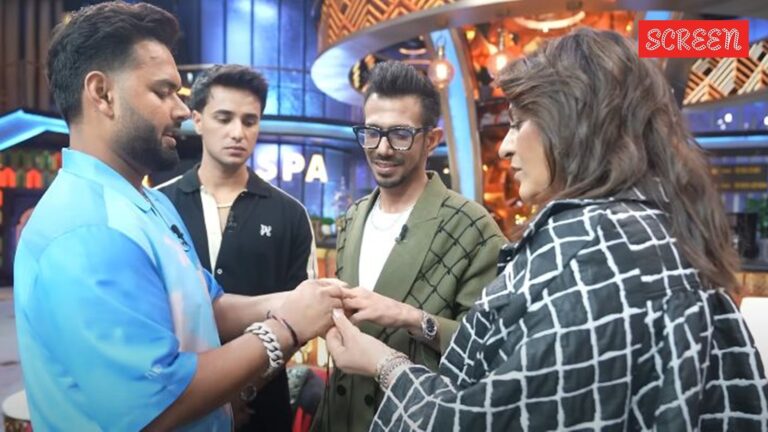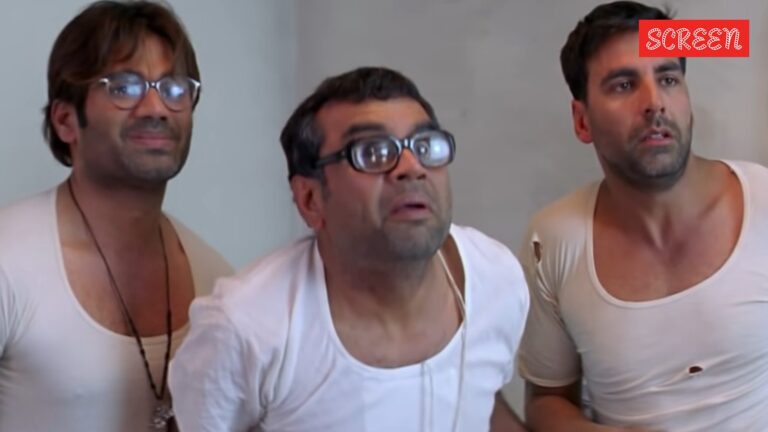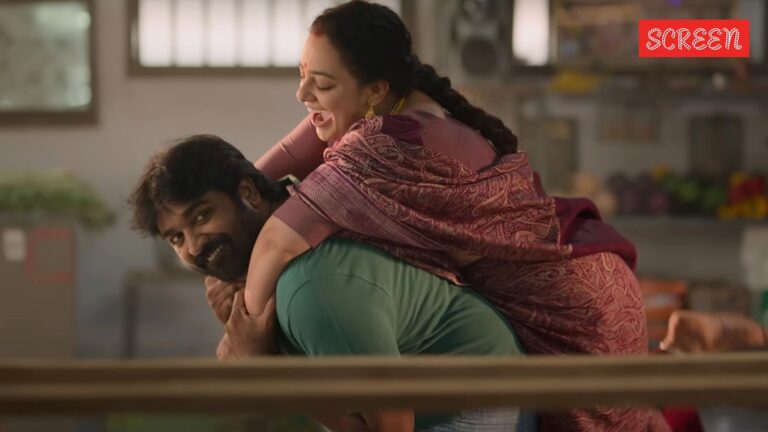Hari Hara Veera Mallu movie review: If not for its outrageously didactic take on concepts of history and Dharma, Hari Hara Veera Mallu had all the makings of an exciting comic book-style folk hero story for our times.
Veera Mallu is a famed (and fictionalised) Robin Hood-like figure from 17th-century India, tasked with stealing the Koh-i-Noor from Mughal overlord Aurangzeb’s throne in Delhi. Having been originally mined by exploited labourers in the Kolluru region of present-day Andhra Pradesh, the regal diamond found ‘home’ at the Sultanate of Golconda before it was snatched away to the Red Fort.
But Aurangzeb’s reputation as the most ruthless, blood-thirsty ruler of the land precedes him at this point, and recovering the stone back to the Deccan is beyond impossible – except for Veera Mallu, the only man capable of throwing himself into the jaws of danger and getting the job done.
On paper, Hari Hara Veera Mallu is a heist adventure that traces a crucial and controversial period of Indian history. In the spirit of Telugu cinema’s trademark swashbuckler sagas, the Pawan Kalyan-led film pits a prince of the streets against a dreadful dictator to set up a delectable clash that also takes in several other aspects of the time, including the colonial hegemony, the growing social hierarchy, religious persecutions, cultural invasions, and so much more.
Yet, the much-awaited endeavour arrives in theatres after a long delay reeking only of laziness and juvenility. This is a film in which every element, from start to finish, is soaked in artifice and is completely devoid of the agency or emotional intelligence that one might even find in a regular school play. If the completely lacklustre visual effects are one issue, the narrative that piles on one exaggerated moment after another in the name of intensity makes the whopping 163-minute runtime feel almost punishing. Even for an actor of the stature of Pawan Kalyan, who once enthralled masses simply with his onscreen charisma, the task of carrying such a lifeless film becomes too much to deliver, and it doesn’t help either that he is sleepwalking through his largely mechanical performance.
Watch the trailer of Hari Hara Veera Mallu:
In fact, the dissonance about Hari Hara Veera Mallu is apparent right from the opening credits, which thank filmmaker Krish Jagarlamudi and his team for being the “foundation and pillar” of the project. It is no secret that Krish Jagarlamudi (credited as the screenwriter) originally conceived the mega project and even directed a good chunk of it before making way for AM Jyothi Krishna (son of film’s producer AM Rathnam), who completed the first installment following numerous hurdles. How, why and when the latter took over isn’t exactly clear, but one could find the final output being severely compromised by the presence of two dissimilar “creative” visions.
The opening scene, for instance, portrays marginalised labourers subjected to cruel exploitation by upper-caste men. Its visceral treatment sets the tone well, and suggests that as much as the battle is against Aurangzeb’s most extreme tyranny, the story also rallies for the poor and the marginalised of all faiths. But the film quickly loses focus and starts to spiral into a kind of misplaced propaganda that never attempts to find any sense of purpose: vapid scenes about the powers and purity of one faith are continually juxtaposed with those portraying the alleged demonic attributes of another, and Hari Hara Veera Mallu: Part 1 runs amok knowing that it is stereotyping and subtly vilifying a particular community. Yes, to its credit, it also points out that several innocent Muslims too fell prey to barbarism of the era and that both Hindus and Muslims eventually found themselves on the same side, but the case-at-large it makes is far too blunt and lacking in nuance to be taken seriously.
Story continues below this ad
That said, the problem lies not just in the film’s gaze, but more so in the uninspired visual realisation of the story. Despite the services of seasoned cinematographers Gnana Shekar VS (Krish Jagarlamudi’s long-time collaborator) and Manoj Paramahamsa, the visual palette only makes a fleeting impression while the production design mostly resembles a theme-park version of history. AM Jyothi Krishna’s aesthetic lacks the paramount world-building skills, and his staging never really suggests that a plausible, though hyperbolic, story is unfolding in front of us. Even the staging is soulless, which in turn causes the acting performances of the ensemble cast, including many noteworthy names like Sathyaraj, Nasser, Sachin Khedekar, the late Kota Srinivasa Rao, Sunil, and others, to feel campy. Bobby Deol is succinctly made to play the Mughal ruler with the same one-dimensional vitriol as in Animal (2023), whereas Nidhi Agerwal struggles with a poorly written role.
MM Keeravani, then, is made to overcompensate as Hari Hari Veera Mallu grows restless in trying to appease its audience. While the ace composer infuses some personality into the score, the bland narrative never really allows us to grasp the soundscape, let alone appreciate it. The underwhelmingly designed action sequences and the appalling visual effects do not help, regardless, and the film blandly trudges on from one scene to another as a result.
Also Read | Hari Hara Veera Mallu movie release LIVE Updates
Does that mean that nothing is redeeming about this? Well, the word potential crops up once again, and there is no doubt that Hari Hara Veera Mallu is a grossly misinterpreted and misguided project from the creators themselves. At one point, I fancied the idea of seeing the story in the form of a series of comics or a lighthearted yet slick animation film that chronicles the escapades of a fictional folk hero – mainly because the subject carries enough fascination in terms of the history it tackles and the fun alternatives it recommends to a generation that now has lost all historical perspective. Or, it could have been a courageous experiment like Lijo Jose Pelissery’s Malaikottai Vaaliban (2024), which employs fiction chiefly to embellish and enhance lesser-known history.
Story continues below this ad
Instead, the film busies itself as an agenda vehicle that doesn’t value one’s time, effort or money. Although it positions itself as a ‘seeker of uncomfortable truths’, it doesn’t equip itself with the right kind of intent or artistry to deliver the experience that many sought from it. For the fans of Pawan Kalyan, his return to the fore will feel more obligatory than whole-hearted, and the actor himself would ideally wish to correct the wrong and see himself back in his old glory. For now, all one could do is let out a long, weary sigh and move on.
Hari Hara Veera Mallu movie director: Krish Jagarlamudi, AM Jyothi Krishna
Hari Hara Veera Mallu movie cast: Pawan Kalyan, Bobby Deol, Nidhhi Agerwal, Nargis Fakhri, Nora Fatehi, Sathyaraj
Hari Hara Veera Mallu move rating: 1.5 stars

























